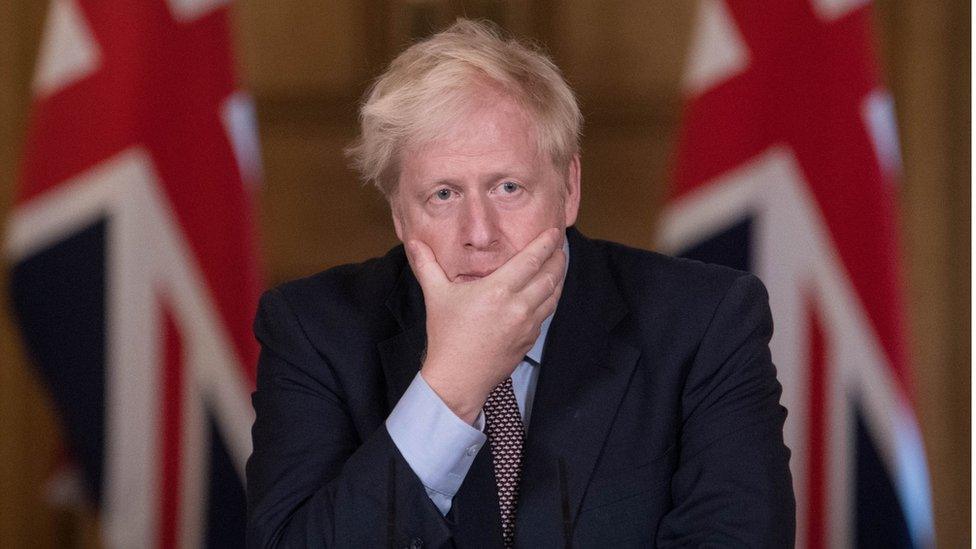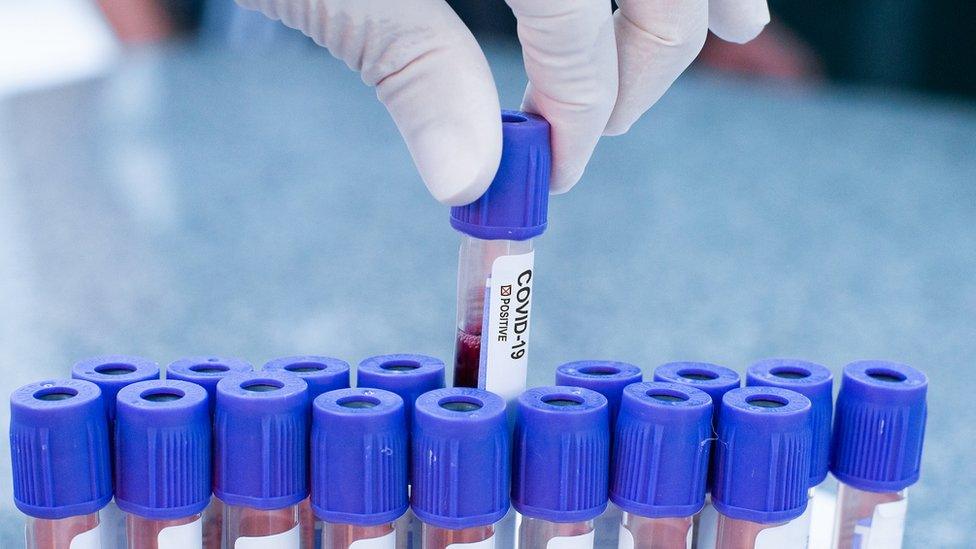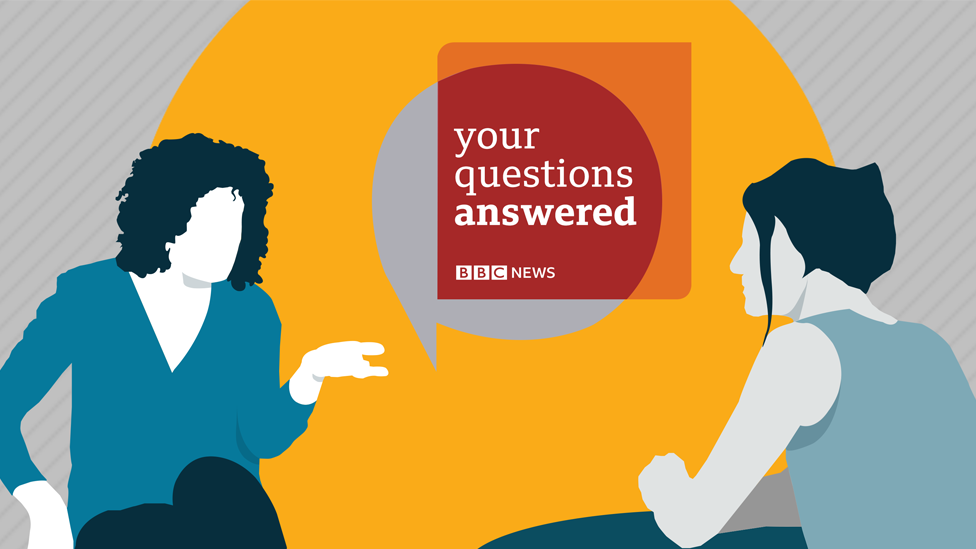Coronavirus: Concerns over Boris Johnson's 'moonshot' testing plans
- Published
- comments

Scientists and health professionals have raised doubts about Prime Minister Boris Johnson's "Operation Moonshot" plan for mass coronavirus testing.
The PM hopes millions of Covid-19 tests - including some giving results within minutes - could be processed daily.
But experts say there are issues with laboratory capacity for current tests, while the technology for more rapid tests "does not, as yet, exist".
The British Medical Journal says leaked memos show the plan could cost £100bn.
Speaking after his announcement that gatherings in England are to be restricted to six people from Monday, Mr Johnson said the government was "working hard" to increase testing capacity to 500,000 tests a day by the end of October.
And he said that "in the near future" he wanted to start using testing "to identify people who are negative - who don't have coronavirus and who are not infectious - so we can allow them to behave in a more normal way, in the knowledge they cannot infect anyone else".
Mr Johnson added: "We believe that new types of test which are simple, quick and scalable will become available. They use swabs or saliva and can turn round results in 90 or even 20 minutes.
"Crucially, it should be possible to deploy these tests on a far bigger scale than any country has yet achieved - literally millions of tests processed every single day."
Mr Johnson said a mass-testing programme could be ready by the spring and could help the UK to avoid a second national lockdown.

But Dr Chaand Nagpaul, council chairman of the British Medical Association, said it was unclear how the so-called Operation Moonshot would work - given the "huge problems" currently seen with lab capacity.
Dr Nagpaul added the idea of opening up society based on people testing negative for the virus should be "approached with caution" because of the high rate of "false negatives" and the potential to miss those who are incubating the virus.

Distraction from difficult decisions ahead

Many experts believe plans to roll out mass rapid testing this winter is unrealistic. Piloting is still taking place to see if the technologies work - millions of tests would then need to be manufactured and distributed.
The focus on this "moonshot" plan is perhaps a distraction from the difficult decisions the country faces.
The level of infection is still low - despite the recent rises.
But do not expect them to stay this way.
Respiratory viruses tend to do better in the autumn and winter because of the colder weather and fact people are indoors more.
Ministers will then face the choice of more restrictions to try to curb the virus in the knowledge these will damage people's health in other ways as well as harming education and the economy.
Or let the virus spread, while focusing efforts on protecting the vulnerable - that means protecting care homes and perhaps reintroducing shielding.
Lockdown bought us time, but simply deferred the problem.
Progress has been made in the past six months - there are better treatments, more testing and a network of contact tracers - but perhaps not as much as hoped.
The UK - like all nations - faces a tricky act of balancing harms.

Dr David Strain, clinical senior lecturer at the University of Exeter and chairman of the BMA's medical academic staff committee, said the mass-testing strategy is "fundamentally flawed" and is "based on technology that does not, as yet, exist".
"The prime minister's suggestion that this will be as simple as 'getting a pregnancy test' that will give results within 15 minutes is unlikely, if not impossible, in the timescale he was suggesting to get the country back on track."
While Prof Sir David Spiegelhalter, a statistician at the University of Cambridge, warned it could also lead to false positives - with hundreds of thousands of people being wrongly told they have coronavirus.
England's deputy chief medical officer Dr Jenny Harries acknowledged that the "the tricky thing with this is not so much the technology, which I'm sure we will have in the very short while in weeks to months, the issue actually is how it gets used in practice".
"So that, if you have, for example, a false negative test, but you feel assured that you don't have the disease, you don't end up going back into the workplace."
BBC Reality Check looks at why testing matters
Currently, between 150,000 and 200,000 tests are processed each day.
Testing capacity is reported as being 350,000 a day - and this includes 250,000 swab tests (which check if you have the virus currently) as well as 100,000 antibody tests (which check if someone has already had the virus).
Earlier this week a director of the government's test and trace programme in England issued a "heartfelt" apology for problems with the testing system, explaining that laboratories, not the testing sites themselves, were the "critical pinch-point".
The UK has drawn up plans to eventually carry out up to 10 million Covid-19 tests a day by early next year - at a cost of more than £100bn, which is approaching the entire annual budget for NHS England, according to a report in the BMJ., external
The new rapid tests will be piloted in Salford from next month.
The government's chief scientific adviser, Sir Patrick Vallance, said the technology needed to be "tested carefully" and it would be "completely wrong to assume this is a slam dunk".
The plans for mass testing come as Scotland launched its new contact tracing app, with First Minister Nicola Sturgeon urging as many people as possible to download it.
The contact tracing app being developed in England ran into technical problems and is currently being tested following a revamp.
'Rule of six'
On Wednesday, Mr Johnson set out a new "rule of six" in England, restricting gatherings to a maximum of six people, external, enforced by police able to issue fines or make arrests, after the UK reported more than 2,000 new coronavirus cases for the fourth consecutive day.
"If everyone does it [the rule of six], we may well be by Christmas in a position to look at it again," Transport Secretary Grant Shapps told BBC Radio 4's Today programme.
The prime minister said the new measures were "not another national lockdown"
Former government adviser Prof Neil Ferguson said the new measures will take about "two to three weeks" to see an effect on the number of cases.
"So we need to wait at this point and see how much we flatten the curve and then if that's not sufficient to bring the reproduction number below one, so the epidemic starts shrinking again, then yes, we may need to clamp down on other areas," he added.
While young people are testing positive at higher rates, Prof Ferguson said it was unavoidable that the virus would resurge in all age groups.
Asked about the return to work, he said: "Certainly I think we should hesitate and maybe pause at the headlong rush to get everybody back into offices. But some people have to work and I completely understand the concerns in many quarters that everybody working at home has an economic impact, particularly on city centres."


Meanwhile, a new law will also require businesses such as pubs, restaurants, hairdressers and cinemas to record customers' contact details.
The government has also published its coronavirus guidance for universities ahead of students returning later this month, with full online learning only as a last resort.

SUPPORT BUBBLES: What are they and who can be in yours?
FACE MASKS: When do I need to wear one?
TESTING: What tests are available?

- Published8 September 2020

- Published25 January 2022

- Published22 February 2022

- Published12 January 2021
